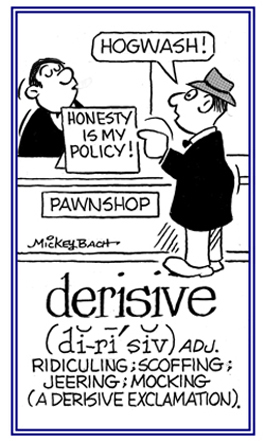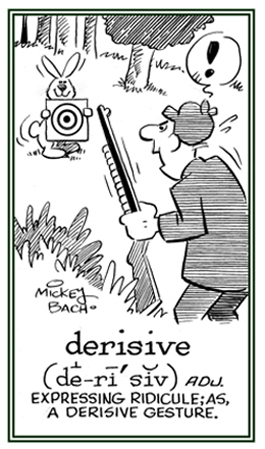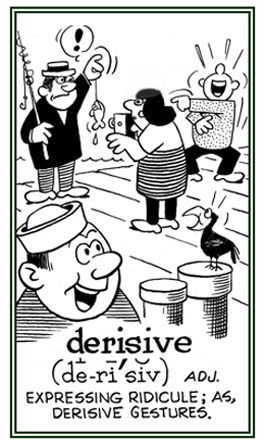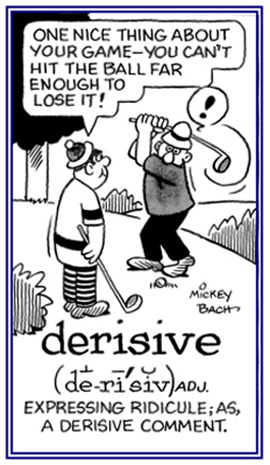de-
(Latin: from, away from, off; down; wholly, entirely, utterly, complete; reverse the action of, undo; the negation or reversal of the notion expressed in the primary or root word)
This cartoon provides an example of what the term derision is expressing.

Go to this Word A Day Revisited Index
so you can see more of Mickey Bach's cartoons.




Go to this Word A Day Revisited Index
so you can see more of Mickey Bach's cartoons.
2. A reference to anything that can be received from ancestors: A derivable estate often comes from a relative.
2. The formation of a term, from another one or from a basic form.
3. The historical origin and development of an entry: An etymology is an example of a derivation
4. A mathematical, or logical argument, whose steps show that the conclusion follows necessarily from initial assumptions.
5. The act of obtaining something from a source or issuing from a source.
6. Etymology: from Latin derivare, "to lead or to draw off (a stream of water) from its source".
Then from Old French deriver. "to flow, to pour out; to originate".
2. A word that is formed from another word; for example, "quickly" from "quick" or "electricity" from "electric".
3. A chemical substance that is formed from a related substance; such as, an opium derivative.
4. A financial product that can be traded and whose value depends on the value of some other asset or combination of assets.
A contract, or security, that derives its value from that of another form ov security or from the value of a rate; such as, interest or a currency exchange, or the index of a stock index.
Derivatives often take the form of customized contracts transacted outside of security exchanges, while other contracts; such as, standard index options and futures, are openly traded on such exchanges.
A derivative is also defined as a contract to buy or to sell an asset or to exchange cash, based on a specified condition, event, occurrence, or another contract.
5. Etymology: from French derivatif (15th century), from Latin derivativus, from the past participle stem of derivare, "to lead or to draw off (a stream of water) from its source"; from de, "from" + rivus. "stream".2. To arrive at by reasoning; to deduce or to infer: Mildred always strives to derive a conclusion from facts rather than from guessing.
3. To trace the origin, or development, of a word.
4. To develop from another word or a source word or term.
5. To create a chemical substance from another substance.
6. Etymology: from Old French deriver; from Latin derivare, "to lead" or "to draw off (a stream of water) from its source"; from the phrase de rivo, from de, "from" + rivus, "stream".
2. Anyone who receives, or obtains something; especially, from a specified person or place.
The queen felt that summoning a parliament would derogate her royal authority.
The book derogated the achievements of the former president of the company.
Jim, the coach, derogated just about everything the new player, Dudley, did on the football field.
2. To stray from a standard or expectation; to deviate: Jason committed an intellectual error that will derogate his reputation as a scholar.2. A deviation from a rule or law; especially, one which is specifically provided for: The Senate Committee required new data in order to determine which sectors of the law would qualify for the derogation.
3. The act of belittling, or criticizing, someone or something: Gary, the radio talk-show host, used derogations to discredit the politician's positions on how to improve the nation's economic situation.


